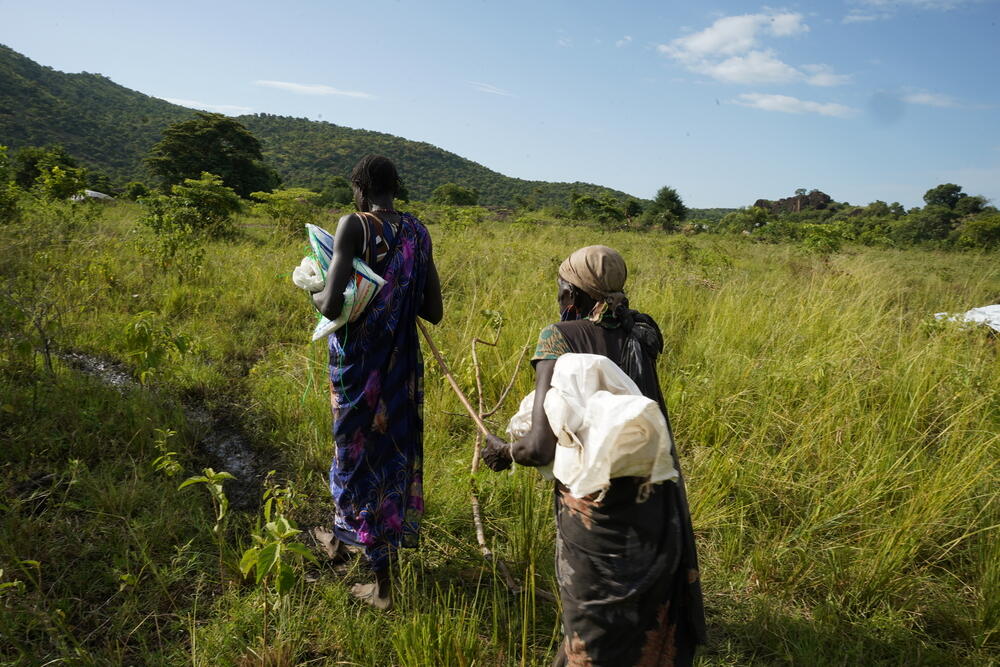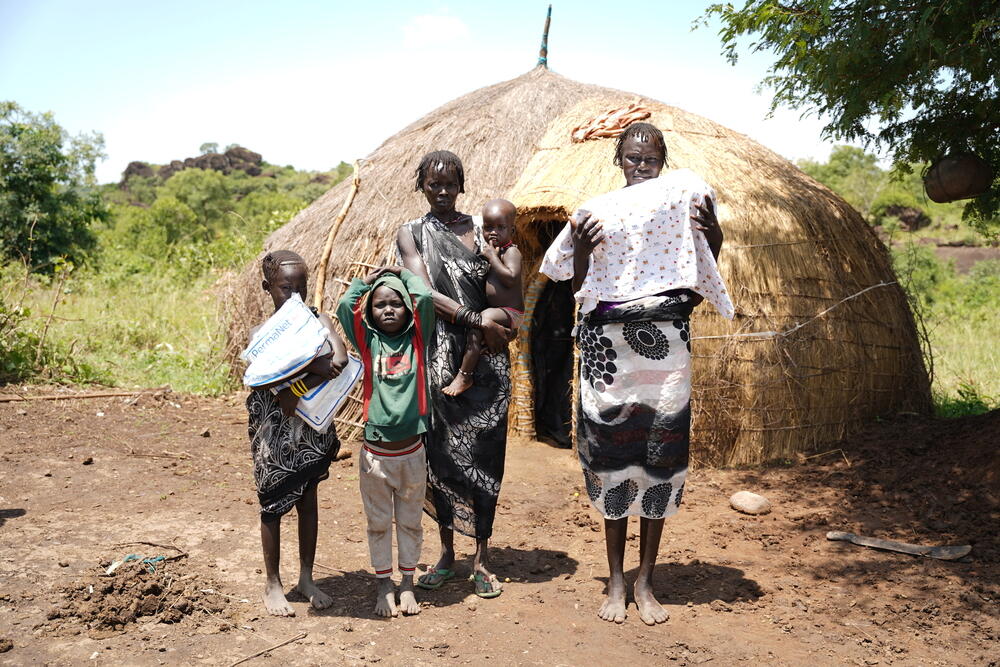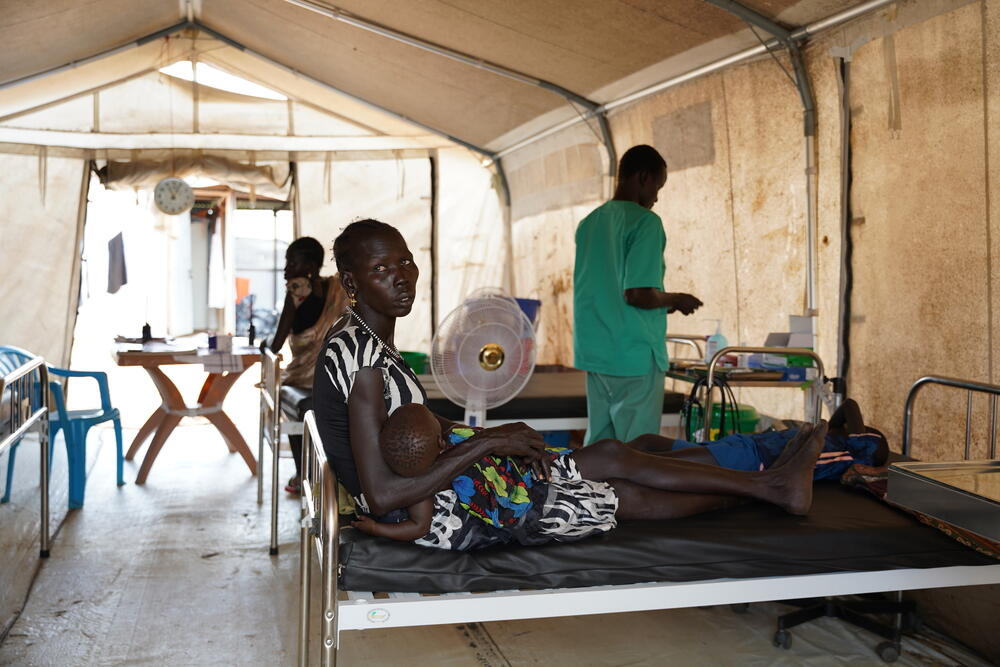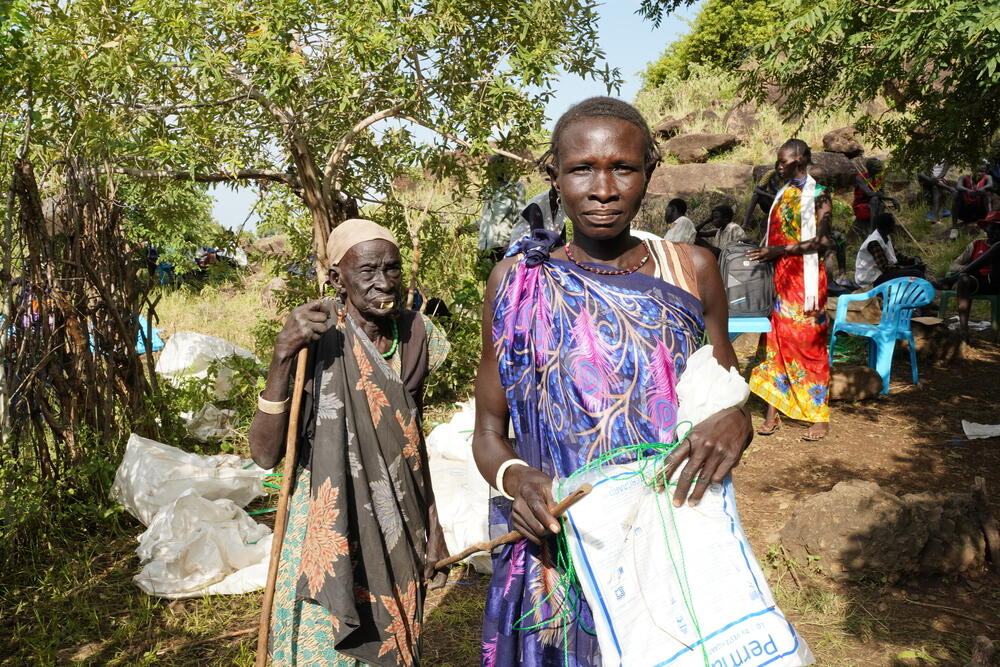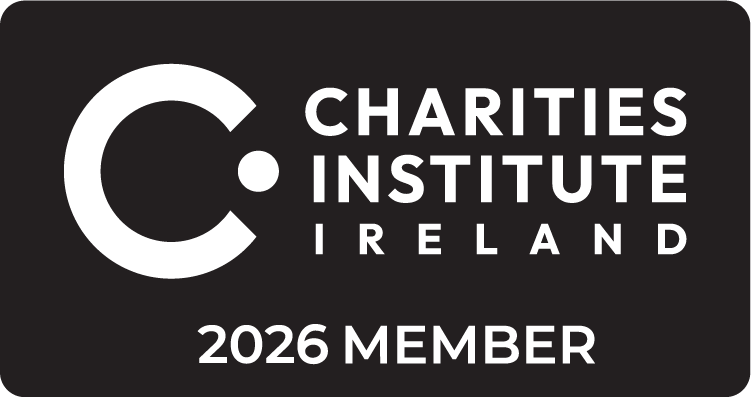World Malaria Day: Malaria in South Sudan- Prevention is an Urgent Task
25 April 2023
On World Malaria Day, learn from the stories of Kirer and Ng'abolo on the importance of preventative action against malaria in South Sudan, where long journeys to access healthcare are common place. MSF runs mobile clinics and community-based healthcare services across South Sudan, to improve accessibility by taking healthcare to people.
"Mosquitoes have been a nuisance for us"
Kirer Koleka is patiently standing at the back of a queue with her one-year-old daughter strapped to her back and her six-year-old daughter by her side. Kirer and her daughters are waiting to receive an essential item- mosquito nets, required to prevent malaria which is endemic in South Sudan. Kirer and her family live in Maruwa in the east of the country in the Greater Pibor Administrative Area- vast region near the border with Ethiopia, where people live in communities scattered over long distances.
"I have lived here for more than 19 years. I used to live beyond the hill on the other side." Kirer says, pointing at a huge nearby hill, whose peak almost seems to touch the clouds. "But had to move to this side to access water in the river down there."
The family has reached the front of the line and Kirer collects a set of four nets. She walks with her daughters back to their home which is about 50 metres from the distribution site. There are two round grass-thatched houses in the compound. With a smile, Kirer quickly unwraps a mosquito net and goes to install it over one of the beds. The other beds have nets over them that look worn out and need replacing.
Kirer explains that "mosquitoes have been nuisance for us. We can barely sleep at night. During the day, the flies would not let the children sleep well. I am so happy and thankful to these people(MSF) for giving us mosquito nets, and I pray for them."
"Before MSF came, we would use traditional herbs and other healing methods when we got sick."
"I have known malaria for years. Even my son here had malaria last month. I took him to the MSF clinic (Public Health Care Unit) in Maruwa where they drew his blood to test and he was found to have malaria. We were given some medicines and allowed to go home. He recovered after about one week. I also had malaria recently and was treated at the facility."
"Before MSF came, we would use traditional herbs and other healing methods when we got sick. Sometimes it worked, and other times we'd have to endure the pain a while longer."
MSF malaria treatment services
If simple malaria is left untreated, it can become severe. Those who develop severe malaria require urgent hospital care- and often need blood transfusions are not available at the MSF clinic in Maruwa which provides the community with outpatient services. MSF is one of the few organisations providing support in the area and patients that develop severe malaria must be transferred to the larger MSF Public Health Care Unit in Boma to receive treatment.
The most effective treatment for malaria is artemisinin- based combination therapy (ACTs). ACT have low toxicity, few side effects and act rapidly against the parasite but in South Sudan these medecines are scarcely available outside of the facilities supported by international non-government organisations and donors. Treating people with malaria is resource intensive, filling up limited beds and expanding medicines in short supply, so improving the prevention of malaria is an urgent task.
To increase protection for communities, MSF runs several additional preventive activities around the country including:
- Indoor residual spraying with insecticide programmes and ensuring sanitation of stagnant water to reduce the numbers of host mosquitoes, which is especially important in flood prone regions.
- Running community awareness programmes to increase understanding about how to protect yourself from being bitten by mosquitoes.
- Seasonal Malaria Chemoprevention (SMC), which involves providing antimalarial drugs to prevent infection among those most at risk- children under five.
"I find nets to be quite important"
Another mother, Ng’abolo Toitoi, is also here collecting mosquito nets explaining “I find nets to be quite important for three reasons: one, they protect us from mosquito bites when we sleep. Two, they protect my children from flies when they sleep during the day. They also protect us from snakes that may wander into the house.
“I know malaria. My three-year-old son got malaria last Sunday. He developed lesions around the mouth, had high body temperatures and was complaining of joint pains. I took him to the MSF clinic in Maruwa. It took slightly more than an hour on foot.”
Long journeys from remote homes to access healthcare are common place and a huge barrier to accessing adequate care in Maruwa and around South Sudan. In addition to the Public Health Care Unit in Maruwa, MSF also runs mobile clinics and community based healthcare services to improve accessibility by taking healthcare to people.
"I know malaria. My son got malaria. I took him to the MSF clinic in Maruwa. It was slightly more than an hour on foot."
MSF treated 267,980 patients in South Sudan for malaria in 2022- a tiny percentage of the over 4 million cases recorded annually- yet these numbers may well underestimate the true severity of the crisis. Many children die from malaria in their homes and villages which are too far away from health facilities. MSF continues to support the people of South Sudan with effective preventative action so mothers like Kirer and Ng'abolo can protect themselves and their families from malaria infection.
